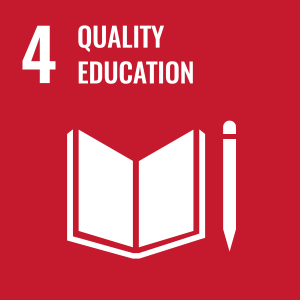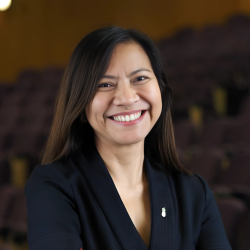Data to Impact Challenge winner champions global education equity
This year’s winner of Surrey Business School’s (SBS) Data to Impact Challenge, MSc FinTech and Policy student Bhima Ramkhelawon, took on a critical global issue – UN Sustainable Development Goal 4: Quality Education – by asking a transformative question: 'What if countries were reclassified based on educational attainment rather than income or geographic region?'

In her project, Bhima merged three public global datasets and applied cluster analysis to identify countries with similar levels of educational quality. Her analytical approach highlighted stark disparities, particularly in regions such as Western Asia and Northern Africa, where access to formal education ranges from as low as 47% to as high as 99%, despite being grouped under the same development classifications.
Senior Lecturers in Business Analytics and judges at the competition, Dr Andy Hill and Dr Athina Ioannou, share the following statement:
“Bhima identified a need to reclassify countries according to educational attainment to meet the UN’s Sustainable Development Goal 4, Quality Education. This goal recognises education as a fundamental human right and a key driver for economic growth.
"Bhima showed an adept use of analytics techniques to highlight insights around where gaps lay in countries’ education progress. She showed the importance of combining datasets to generate context – and thus, relevant insight.
"The merging of datasets that enable analysts to provide decision-makers with novel insights is a key skill that employers need. That’s why we emphasise this ability in our degree programmes, especially on modules such as Applied Analytics in Business and in our Business Analytics MSc, using tools such as SQL, Python, Tableau and Power BI to bring data to life.”
Bhima’s innovative classification system proposed four new categories of countries based on the proportion of their populations receiving quality education. Her recommendations went beyond the data, offering practical policy suggestions – from incentivising employers to support basic education, to creating global student volunteering programmes and repurposing educational materials for underserved regions.
Her winning entry reflects the kind of data-informed, socially responsible innovation Surrey Business School strives to cultivate – where analytics are used not just to measure, but to transform.
Reflecting on her success, Bhima said:
“I am honoured to have been selected as a winner of the Data to Impact Challenge 2025. Taking part in this competition provided a unique opportunity to present my work addressing UN Sustainable Development Goal 4: Quality Education.
"My project introduces a new classification model for countries based on national education levels, with each segment assigned attainable, annual objectives. This approach aims to support more targeted and realistic progress in global education policy.
"I’m especially grateful to the University of Surrey for hosting such an inspiring initiative that empowers data-driven solutions to global challenges.”
The Data to Impact Challenge was made possible through the SBS Dean’s Priorities Fund, which empowers students like Bhima to engage in meaningful learning and innovation with real-world relevance and impact. We invite partners and supporters who share Surrey Business School’s mission to nurture responsible, future-focused problem-solvers to contribute – and help scale initiatives like Bhima’s, where data meets purpose.
Related sustainable development goals



